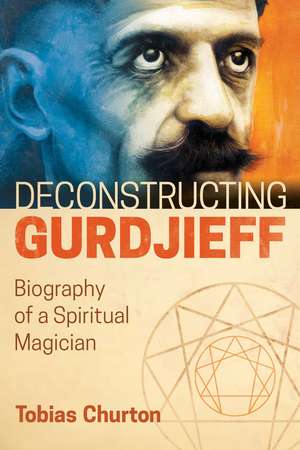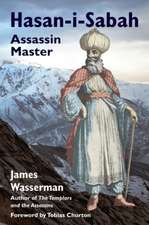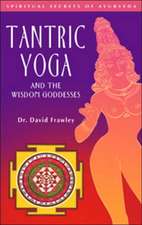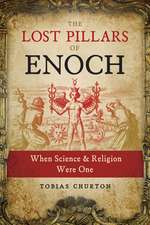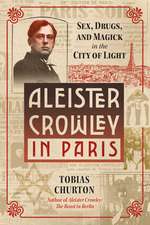Deconstructing Gurdjieff: Biography of a Spiritual Magician
Autor Tobias Churtonen Limba Engleză Hardback – 29 iun 2017
In November 1949, architect Frank Lloyd Wright announced the death of “the greatest man in the world,” yet few knew who he was talking about. Enigmatic, misunderstood, declared a charlatan, and recently dubbed “the Rasputin who inspired Mary Poppins,” Gurdjieff’s life has become a legend. But who really was George Ivanovich Gurdjieff? Employing the latest research and discoveries, including previously unpublished reminiscences of the real man, Tobias Churton investigates the truth beneath the self-crafted mythology of Gurdjieff’s life recounted in Meetings with Remarkable Men. Showing how Gurdjieff deliberately re-shaped elements of his life as parables of his system, Churton explains how he didn’t want people to follow his footsteps but to find their own, to wake up from the hypnosis that drives us blindly through life. Offering a vital understanding of the man who asked “How many of you are really alive?” the author reveals the continuing importance of Gurdjieff’s philosophy for the awakening of man.
Preț: 125.12 lei
Preț vechi: 168.01 lei
-26% Nou
Puncte Express: 188
Preț estimativ în valută:
23.94€ • 24.100$ • 19.81£
23.94€ • 24.100$ • 19.81£
Carte disponibilă
Livrare economică 21 martie-02 aprilie
Preluare comenzi: 021 569.72.76
Specificații
ISBN-13: 9781620556382
ISBN-10: 1620556383
Pagini: 368
Dimensiuni: 152 x 229 x 28 mm
Greutate: 0.43 kg
Editura: Inner Traditions/Bear & Company
Colecția Inner Traditions
ISBN-10: 1620556383
Pagini: 368
Dimensiuni: 152 x 229 x 28 mm
Greutate: 0.43 kg
Editura: Inner Traditions/Bear & Company
Colecția Inner Traditions
Notă biografică
Britain’s leading scholar of Western Esotericism, Tobias Churton is a world authority on Gnosticism, Hermeticism, and Rosicrucianism. An Honorary Fellow of Exeter University, where he is a faculty lecturer, he holds a master’s degree in Theology from Brasenose College, Oxford, and is the author of many books, including Aleister Crowley: The Beast in Berlin and Occult Paris. He lives in the heart of England.
Extras
Introduction
Caveat Lector*
Biographers of Gurdjieff are faced with a serious problem: the extreme scarcity of authentic independent documentation of Gurdjieff ’s life both up to his appearance in Moscow in 1912-13 and between that time and the Russian Revolution in 1917. Gurdjieff was at least forty years old in 1917, his mind, self-appointed destiny, and fundamental attitudes already fully shaped by previous experience. As regards factual support for that experience, Gurdjieff ’s name finds its way into barely a handful of official documents, themselves not wholly reliable. Seismic tumults from the collapse of the old Russian Empire, aggravated by the twentieth century’s immense conflicts and totalitarian vandalism, have sundered and fragmented the historic continuity that might otherwise have yielded collaborative resources from the Caucasus and Transcaucasia regions in which Gurdjieff grew up. Gurdjieff destroyed his own papers during a protracted personal crisis in 1930. We have no volume of Gurdjieff ’s letters or diaries, however slim, to consult. Personal reminiscences of followers, often highly subjective, are frequently at variance with one another and with verifiable facts.
Self-perceived as a man apart, a kind of spy in a confused, damned world, Gurdjieff persistently objectified the human beings around him; the first thing Gurdjieff ’s most influential follower P. D. (Pyotr Demianovich) Ouspensky noticed about his teacher in Moscow in 1915 was that Gurdjieff was always acting. Gurdjieff was many men and appeared in many disguises. Was he hiding something, or was he hiding from something?
In the Introduction to Meetings with Remarkable Men,(1) written after 1924 and published after his death, Gurdjieff explains that part of his purpose in writing the book is to save himself future trouble in having to answer questions from interlocutors concerning his life and, especially, his beliefs. He complains that such questions have been vexatious to concentration on other more pressing matters and regards these questions merely as ones put by “idle curiosity.” Those interested in his personal life are described as “shameless idlers.” To satisfy their curiosity he has nonetheless, “in revising the material destined for this series [he means this book]” decided to present it “in the form of separate independent tales, and to insert in them various ideas which can serve as answers to all the questions often put to me.” The questions put to him are, he says, to do with the “remarkable men” he has encountered; “marvels” seen in the East; questions of the immortality of the soul; whether or not man has free will; the cause of suffering; the credibility of “occult and spiritualistic sciences”; the nature of hypnotism, magnetism, and telepathy; how he first became concerned with such questions; and what then led him to the system practiced in the institute bearing his name.
Gurdjieff, conscious of writing a “new kind” of book, deliberately shaped and reshaped elements of his life and imagination as illustrations or parables of his system. He dramatized ideas. The ideas might be real but individual characters may not be, though their behavior may be truthful regarding human nature or Gurdjieff ’s ideas of ideal or misguided action, observed from experience.
The cooked-up book is what the dramatist Bertolt Brecht (1898-1956) would call a lehrstücke, a “learning-play” or experimental teaching piece wherein actors adopt roles, postures, and attitudes that exceed conventional distinctions between stage and audience, between idea, image, event, and reality, fact and fiction. Brecht famously declared, “Realism does not consist in reproducing reality, but in showing how things really are.”
In the case of Gurdjieff ’s book, Gurdjieff is principal actor as well as narrator, and elements of his experiences, fantasies, prior reading, and thoughts--and what he considers the fantasies and expectations of his readers--play the parts; Gurdjieff “sings their tune.” We can see why Gurdjieff has most appealed to actors, dancers, musicians, painters, impresarios, and storytellers, those especially conscious of the role of symbol and its encoding in artificial forms of address. Artists get or “cotton on” to congenial aspects of Gurdjieff, whereas more prosaic, sometimes troubled minds--perhaps his principal following--struggle with it all, often for years, perennially taking the “black devil” too literally, perhaps too respectfully.
Gurdjieff ’s idea of science was that of the ancient Magi, not the modern classroom. He barely ever disguised his loathing for what today is called, without irony, higher education. I personally suspect he had a chip on his shoulder about never having graduated from university, so vehement were his repeated digs at “wiseacreing,” an ungainly word (in translation) that occurs with tiresome, arguably obsessive repetitiveness throughout all his writings and talks; followers have picked the word up and scatter it like buckshot from on high at critics. Gurdjieff was a “university of life” type of graduate, cynical about cynics. Perhaps to lend authority to conviction, he even invented from the store of reality and myth the archetypal sacred university of wisdom--the Sarmoung Brotherhood--a body of such exalted spiritual purity and genuine universality of insight that its denizens would never soil their elegant hands with the muck of modern education reliant on paper qualifications and bookish memory learning.
Unlike the professional talkers and establishment-acceptable pundits, the self-taught apparently polymathic, autodidact Gurdjieff could turn his hand to anything and persuade people to do things they never dreamed of doing. He was the man you’d think you’d want in a real crisis. He talked the talk because, as far as he was concerned, he had walked the walk. Unfortunately for historians and biographers he mostly fictionalized the walk. He didn’t want people to follow his footsteps, but to find their own.
Gurdjieff ’s “Men” are remarkable insofar as they have recognized that the true value of life comes only when that life consciously acquires mythic dimensions, when one, with feet on the ground, has yet traversed the stars and touched the beyond. Remarkable men have seen something unremarkable men have not. Such men should engage our attention. Was Gurdjieff himself one of them?
*“Reader Beware”
Caveat Lector*
Biographers of Gurdjieff are faced with a serious problem: the extreme scarcity of authentic independent documentation of Gurdjieff ’s life both up to his appearance in Moscow in 1912-13 and between that time and the Russian Revolution in 1917. Gurdjieff was at least forty years old in 1917, his mind, self-appointed destiny, and fundamental attitudes already fully shaped by previous experience. As regards factual support for that experience, Gurdjieff ’s name finds its way into barely a handful of official documents, themselves not wholly reliable. Seismic tumults from the collapse of the old Russian Empire, aggravated by the twentieth century’s immense conflicts and totalitarian vandalism, have sundered and fragmented the historic continuity that might otherwise have yielded collaborative resources from the Caucasus and Transcaucasia regions in which Gurdjieff grew up. Gurdjieff destroyed his own papers during a protracted personal crisis in 1930. We have no volume of Gurdjieff ’s letters or diaries, however slim, to consult. Personal reminiscences of followers, often highly subjective, are frequently at variance with one another and with verifiable facts.
Self-perceived as a man apart, a kind of spy in a confused, damned world, Gurdjieff persistently objectified the human beings around him; the first thing Gurdjieff ’s most influential follower P. D. (Pyotr Demianovich) Ouspensky noticed about his teacher in Moscow in 1915 was that Gurdjieff was always acting. Gurdjieff was many men and appeared in many disguises. Was he hiding something, or was he hiding from something?
In the Introduction to Meetings with Remarkable Men,(1) written after 1924 and published after his death, Gurdjieff explains that part of his purpose in writing the book is to save himself future trouble in having to answer questions from interlocutors concerning his life and, especially, his beliefs. He complains that such questions have been vexatious to concentration on other more pressing matters and regards these questions merely as ones put by “idle curiosity.” Those interested in his personal life are described as “shameless idlers.” To satisfy their curiosity he has nonetheless, “in revising the material destined for this series [he means this book]” decided to present it “in the form of separate independent tales, and to insert in them various ideas which can serve as answers to all the questions often put to me.” The questions put to him are, he says, to do with the “remarkable men” he has encountered; “marvels” seen in the East; questions of the immortality of the soul; whether or not man has free will; the cause of suffering; the credibility of “occult and spiritualistic sciences”; the nature of hypnotism, magnetism, and telepathy; how he first became concerned with such questions; and what then led him to the system practiced in the institute bearing his name.
Gurdjieff, conscious of writing a “new kind” of book, deliberately shaped and reshaped elements of his life and imagination as illustrations or parables of his system. He dramatized ideas. The ideas might be real but individual characters may not be, though their behavior may be truthful regarding human nature or Gurdjieff ’s ideas of ideal or misguided action, observed from experience.
The cooked-up book is what the dramatist Bertolt Brecht (1898-1956) would call a lehrstücke, a “learning-play” or experimental teaching piece wherein actors adopt roles, postures, and attitudes that exceed conventional distinctions between stage and audience, between idea, image, event, and reality, fact and fiction. Brecht famously declared, “Realism does not consist in reproducing reality, but in showing how things really are.”
In the case of Gurdjieff ’s book, Gurdjieff is principal actor as well as narrator, and elements of his experiences, fantasies, prior reading, and thoughts--and what he considers the fantasies and expectations of his readers--play the parts; Gurdjieff “sings their tune.” We can see why Gurdjieff has most appealed to actors, dancers, musicians, painters, impresarios, and storytellers, those especially conscious of the role of symbol and its encoding in artificial forms of address. Artists get or “cotton on” to congenial aspects of Gurdjieff, whereas more prosaic, sometimes troubled minds--perhaps his principal following--struggle with it all, often for years, perennially taking the “black devil” too literally, perhaps too respectfully.
Gurdjieff ’s idea of science was that of the ancient Magi, not the modern classroom. He barely ever disguised his loathing for what today is called, without irony, higher education. I personally suspect he had a chip on his shoulder about never having graduated from university, so vehement were his repeated digs at “wiseacreing,” an ungainly word (in translation) that occurs with tiresome, arguably obsessive repetitiveness throughout all his writings and talks; followers have picked the word up and scatter it like buckshot from on high at critics. Gurdjieff was a “university of life” type of graduate, cynical about cynics. Perhaps to lend authority to conviction, he even invented from the store of reality and myth the archetypal sacred university of wisdom--the Sarmoung Brotherhood--a body of such exalted spiritual purity and genuine universality of insight that its denizens would never soil their elegant hands with the muck of modern education reliant on paper qualifications and bookish memory learning.
Unlike the professional talkers and establishment-acceptable pundits, the self-taught apparently polymathic, autodidact Gurdjieff could turn his hand to anything and persuade people to do things they never dreamed of doing. He was the man you’d think you’d want in a real crisis. He talked the talk because, as far as he was concerned, he had walked the walk. Unfortunately for historians and biographers he mostly fictionalized the walk. He didn’t want people to follow his footsteps, but to find their own.
Gurdjieff ’s “Men” are remarkable insofar as they have recognized that the true value of life comes only when that life consciously acquires mythic dimensions, when one, with feet on the ground, has yet traversed the stars and touched the beyond. Remarkable men have seen something unremarkable men have not. Such men should engage our attention. Was Gurdjieff himself one of them?
*“Reader Beware”
Cuprins
Acknowledgments
Preface: Caveat Lector
ONE The Enigma Arrives
Meeting the Press
TWO Reviewing the Situation: A Birth
Archival Records
Cattle Plague
THREE War Baby: An Education in Kars
FOUR Dean Borshch and Other Enthusiasms
The Circle of the Yezidi
Bogachevsky and the Flying Chairs
FIVE The Spiritual Question
Miracles
Spiritualism and Hypnosis
SIX Mad about the Girl: Or How to Get to Tiflis in a Hurry
Fedeev and Blavatsky
Tiflis
SEVEN Books: Furniture of the Mind
The Tradition
The Brotherhood of the Rose-Cross
EIGHT In Search of Brotherhood
The Armenian Question Ani
NINE The Yezidis
The God of the Yezidis
Melek
Tawus
Yezidi Beliefs
Origins
TEN Do-It-Yourself Gurdjieff and Unaccountable Journeys Miscellaneous Adventures
The Sufis
Back to Work with Gurdjieff
ELEVEN Traveling Tales and Bullets in the Leg
Soloviev and the Kushka Line
Toward the Sarmoung Monastery
TWELVE Two More Bullets
Trouble in Tibet
The Chiatura Tunnel
THIRTEEN Holy Mother Russia!
Papus in Russia
The Unique Work Brotherhood
FOURTEEN The Struggle of the Magicians
FIFTEEN Octave and Enneagram
From Seven to Eight
Nine in the Circle
SIXTEEN The International Alliance of Ideological Workers
Tbilisi
SEVENTEEN Stateless Person
Constantinople
John Godolphin Bennett, Prince Sabahaddin, and Gurdjieff
EIGHTEEN Doctrine: An Objectively Impartial Criticism of the Life of Man
NINETEEN The Beast 666 and the Black Devil
TWENTY The Long Ascent
Breaking with Old Friends
The War
TWENTY-ONE The Grave with No Name
Notes
Bibliography
Index
Preface: Caveat Lector
ONE The Enigma Arrives
Meeting the Press
TWO Reviewing the Situation: A Birth
Archival Records
Cattle Plague
THREE War Baby: An Education in Kars
FOUR Dean Borshch and Other Enthusiasms
The Circle of the Yezidi
Bogachevsky and the Flying Chairs
FIVE The Spiritual Question
Miracles
Spiritualism and Hypnosis
SIX Mad about the Girl: Or How to Get to Tiflis in a Hurry
Fedeev and Blavatsky
Tiflis
SEVEN Books: Furniture of the Mind
The Tradition
The Brotherhood of the Rose-Cross
EIGHT In Search of Brotherhood
The Armenian Question Ani
NINE The Yezidis
The God of the Yezidis
Melek
Tawus
Yezidi Beliefs
Origins
TEN Do-It-Yourself Gurdjieff and Unaccountable Journeys Miscellaneous Adventures
The Sufis
Back to Work with Gurdjieff
ELEVEN Traveling Tales and Bullets in the Leg
Soloviev and the Kushka Line
Toward the Sarmoung Monastery
TWELVE Two More Bullets
Trouble in Tibet
The Chiatura Tunnel
THIRTEEN Holy Mother Russia!
Papus in Russia
The Unique Work Brotherhood
FOURTEEN The Struggle of the Magicians
FIFTEEN Octave and Enneagram
From Seven to Eight
Nine in the Circle
SIXTEEN The International Alliance of Ideological Workers
Tbilisi
SEVENTEEN Stateless Person
Constantinople
John Godolphin Bennett, Prince Sabahaddin, and Gurdjieff
EIGHTEEN Doctrine: An Objectively Impartial Criticism of the Life of Man
NINETEEN The Beast 666 and the Black Devil
TWENTY The Long Ascent
Breaking with Old Friends
The War
TWENTY-ONE The Grave with No Name
Notes
Bibliography
Index
Recenzii
"Churton's remarkable ability to make a coherent narrative out of disparate information while also weaving in other research interests, such as the influence of Aleister Crowley, makes this a valuable resource for those familiar with Gurdjieff's work, and it's easily readable for those coming fresh to the topic."
“They seek him here, they seek him there . . . that damned elusive Gurdjieff--part sage, part trickster, part prophet, part legend. Tobias Churton, in pursuit of this enigmatic figure, casts his net both wide and deep and delivers a wonderfully rich and nuanced account of Gurdjieff and the many currents that flowed into his life and teaching.”
“. . . a scholarly journey that pursues an in-depth analysis of this purposely enigmatic spiritual teacher’s biography . . . offers perceptive insights into the spiritual and psychological teachings of Gurdjieff’s idiosyncratic genius and sheds light on the folktale-like stories of the relationship between Aleister Crowley and Gurdjieff. This book is comprehensive,entertaining, and highly recommended.”
“According to Albert Einstein, ‘If you can’t explain it simply, you don’t understand it well enough.’ Churton understands. He has a profound ability to write about complex esoteric subjects in clear, down-to-earth language. Here he delves deep into the life of Gurdjieff in an attempt to separate fact from fiction and the myth from the man. As always, there is great wisdom and a uniquely modern perspective in Churton’s meticulous thought and prose. Deconstructing Gurdjieff, like all his books, is immensely informative, highly provocative--and a great read.”
“Tobias brings to this highly perceptive and realistic picture of Gurdjieff expert knowledge of Western esotericism, the Yezidis, and Aleister Crowley--all of which have long needed a measured place in this mage’s story. This is a timely reappraisal and deconstruction of the spiritual ludibrium and life of a Master.”
“They seek him here, they seek him there . . . that damned elusive Gurdjieff--part sage, part trickster, part prophet, part legend. Tobias Churton, in pursuit of this enigmatic figure, casts his net both wide and deep and delivers a wonderfully rich and nuanced account of Gurdjieff and the many currents that flowed into his life and teaching.”
“. . . a scholarly journey that pursues an in-depth analysis of this purposely enigmatic spiritual teacher’s biography . . . offers perceptive insights into the spiritual and psychological teachings of Gurdjieff’s idiosyncratic genius and sheds light on the folktale-like stories of the relationship between Aleister Crowley and Gurdjieff. This book is comprehensive,entertaining, and highly recommended.”
“According to Albert Einstein, ‘If you can’t explain it simply, you don’t understand it well enough.’ Churton understands. He has a profound ability to write about complex esoteric subjects in clear, down-to-earth language. Here he delves deep into the life of Gurdjieff in an attempt to separate fact from fiction and the myth from the man. As always, there is great wisdom and a uniquely modern perspective in Churton’s meticulous thought and prose. Deconstructing Gurdjieff, like all his books, is immensely informative, highly provocative--and a great read.”
“Tobias brings to this highly perceptive and realistic picture of Gurdjieff expert knowledge of Western esotericism, the Yezidis, and Aleister Crowley--all of which have long needed a measured place in this mage’s story. This is a timely reappraisal and deconstruction of the spiritual ludibrium and life of a Master.”
Descriere
Beyond Meetings with Remarkable Men into the truth behind the self-crafted mythology of Gurdjieff’s life
